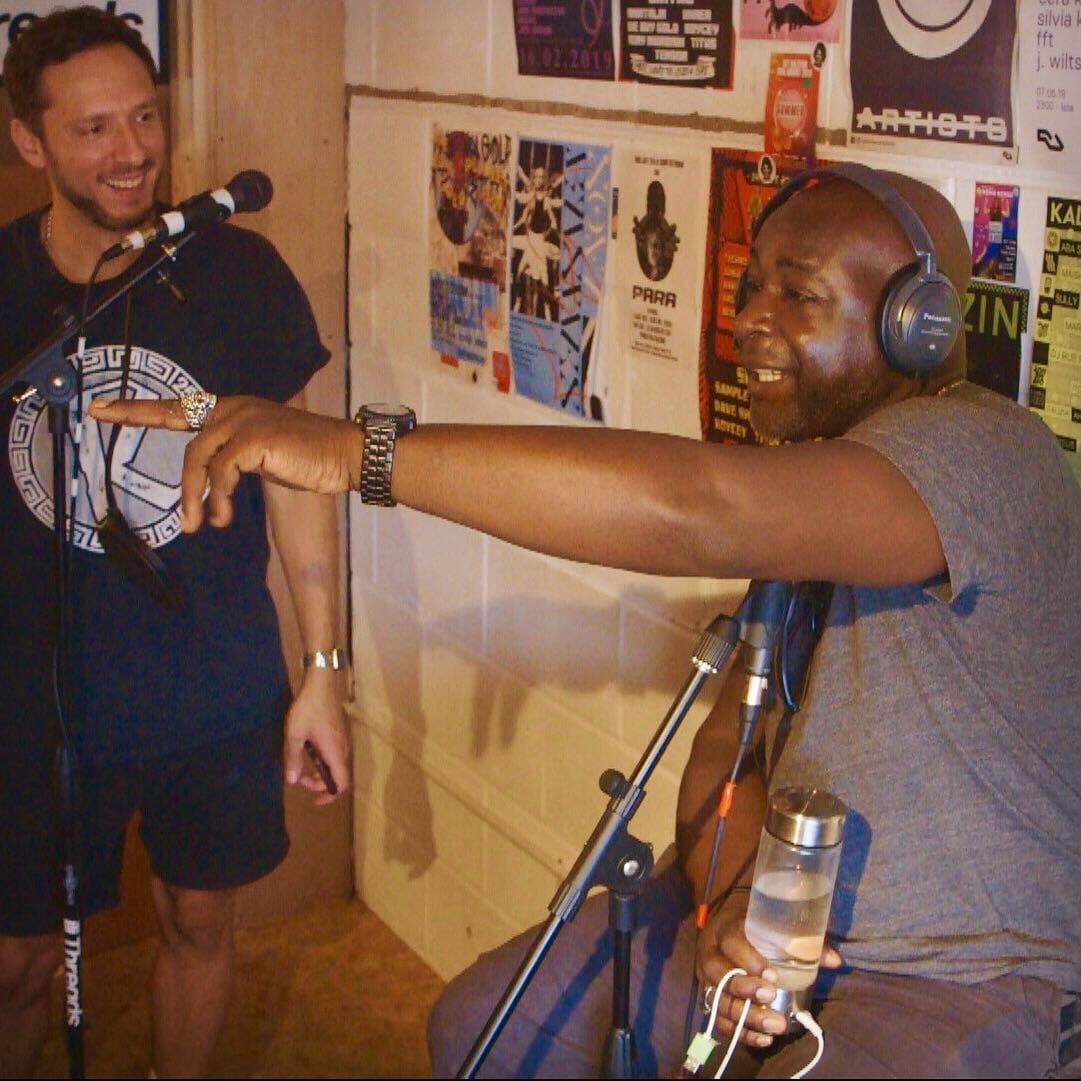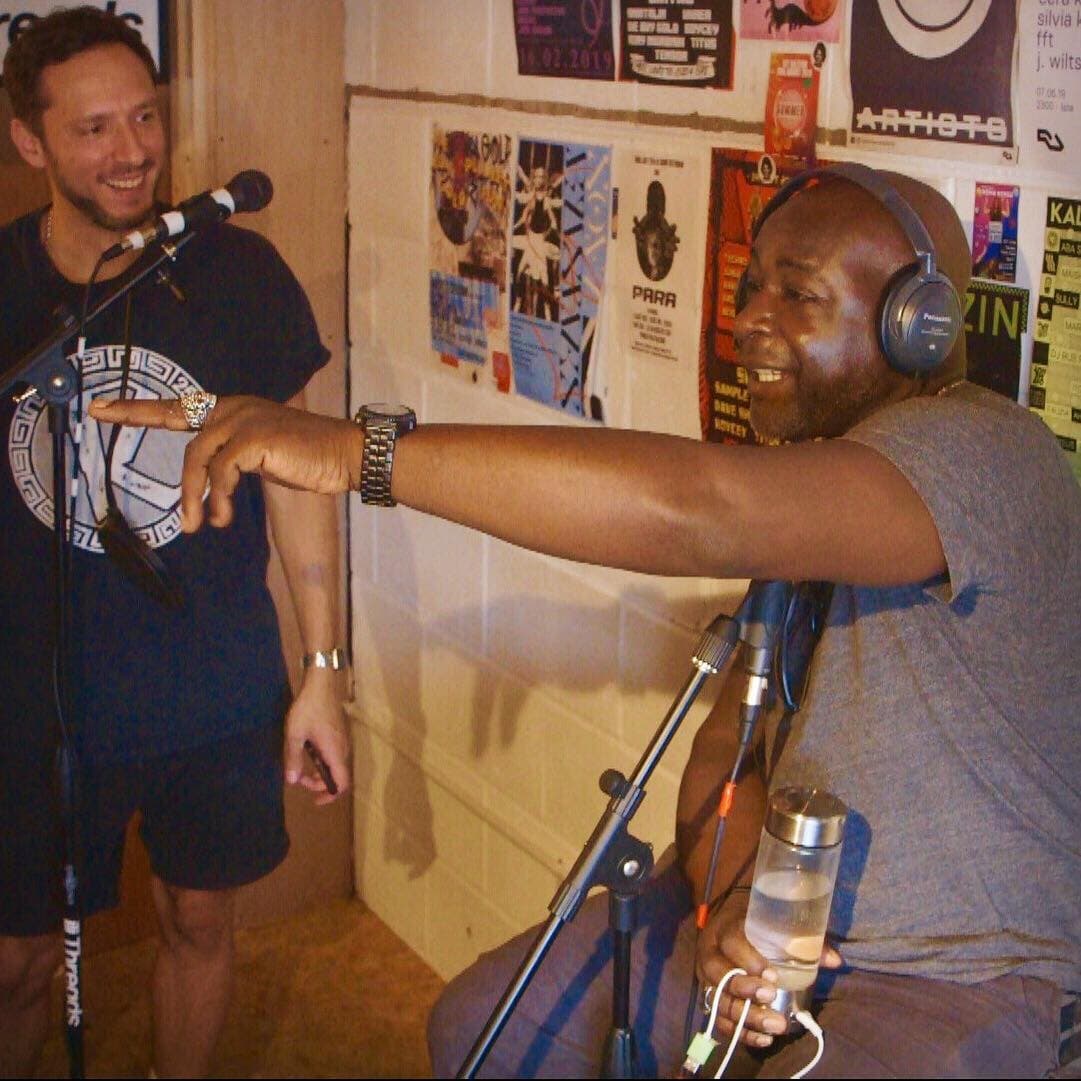
Interview: A Guy Called Gerald / THINGS DISAPPEAR

THINGS DISAPPEAR host Lee Kirk Fagan with Gerald Simpson
Written by Alejandra Cabrera Abasolo.
House music can’t be understood in the UK without the mentioning the legendary Gerald Simpson, more famously known as A Guy Called Gerald. On Thursday 22nd of August, a few days before his second time playing at our lovely home The Cause, Gerald appeared on Threads Radio’s THINGS DISAPPEAR show about his upbringing, the music scene in Manchester and globally in the 80s, and how he sees the present electronic music scene.
Hailing from Manchester, Gerald grew up with a fusion of music, but where jazz and soul were predominant. In Gerald’s household, music took on an important role. His passion for it could be felt in the air while he explained to Threads how there was an atmosphere of constant music when he was growing up.
Gerald’s family’s Jamaican roots had an influence on his musical journey, as well as funk, soul and reggae: “We didn’t have anything else. This became like our escape. I don’t know what I was escaping from but music talked to me. It just grabbed me,” Gerald says. Electronic music was something to dance to, not something to listen to or follow up on the charts for producer. Seeking this danceable music was a goal for him ever since he and his friends discovered electro funk.
Gerald’s journey into music production was an unusual one. He attended a referral school and was asked to choose between sports or a creative pursuit. He chose contemporary & jazz dance, but he felt grabbed by the necessity of replicating the sounds of what had been astonishing him. “The reason I first got a drum machine is actually because in a dance class, we used to have a drummer at the front. When we were doing the warmup exercise, they used to change tempo. The first time I kind of looked at a drum machine, I was like ‘Oh wow, I could do that home’”, he explained.
Miles Davis was the catalyst for the Manchester-born artist. He admits being blown away by the realisation that music could tell a story in such a way. This led to further exploration of constructing narratives through music and his analysis of complex interplay between instruments and composition which lead Gerald to further becoming immersed in music production. At the time, the Manchester scene’s record stores would get hold of the latest productions from Chicago and Detroit straight away. Gerald, inspired by the likes of artists like Derrick May and Juan Atkins began paving his way to becoming an icon in House.
Manchester in the 80s was known mainly for pop, rock and metal. Dance music was still something generally unheard of till the burgeoning rave scene characterised by places such as legendary The Haçienda. Gerald somehow managed to veer off this track and ended up always seeking more experimental stuff that he would find in his innumerable record and music store trips.
In a sort of DIY way, Gerald started to play around with his basic equipment and began making his own tracks: “I thought to myself, I just need like a cheap synthesizer and the drum machine and I can build my own tracks, you know, cause I was listening to all these other like electro funk tracks by then and I thought that I could build something like that.”
All the US imports would make their way into Gerald’s hands. “I was just like scooping all that stuff up. As soon as anything that was electronic came, I wanted it, you know, I wanted to know how it was made, how it was,” he says. He would find inspiration from all this techno and acid house coming and started sampling different sounds on putting them over his drum machine.
“That’s how I get inspiration, I’ll be listening to things that triggered me. So I would get triggered by these tracks that had to just blow me away and that was what Detroit was for me”, Gerald explained. With all of this exploration and production, Gerald helped to shape the country’s dance music identity. Anthems such as Voodoo Ray meant a new language that would start to be spoken in a vast line of productions from then. Gerald continued to bring revolutionary trends starting to produce later on jungle and DnB tracks, with his 1995 album ‘Black Secret Technology’ considered one of the finest jungle records ever.
When asked about the current electronic scene, Gerald says that it has become more focused on monetisation and completely losing the essence of this genre’s roots. “I came from a time when there was more excitement than finance involved in the music,” he says. “Nowadays you can’t really build like a trend or recall or any of these things anymore cause as soon as something becomes what they call viral, it’s over. As soon as you have your little niche or your little thing and you want to put it out there, everybody wants to monetize it and that thing just dissolves into something global.”
Gerald wishes to hear people creating new formulas, because for him this music was always about independence and freedom. Now (for him) it appears like everything created musically now is out of a booklet and that people are afraid to step out of the box and bring forth new sounds, directions and ideas. “It seems like now people are being pushed to do a certain style or this delusion that you need to be on the Boiler Room to get there,” he says laughing. “I want to hear everyone’s own fingerprint. I want to hear everyone being an individual. I want to hear everyone sounding like themselves.”
Apart from this first feeling of distance towards today’s scene, Gerald also finds himself hopeful of all the changes that technology has had in music. “That was my dream, you know, to be able to create a story from things I could just pull out of the air, I mean available in this technology where if I wanted to do a hardcore jungle mix of anything I can just go on YouTube and find anything I can use,” says Gerald.
The last Tribes party at The Cause was Gerald’s second time playing at this shortly to be closed musical oasis in North London and his wonderful selection confirmed him as one of the greatest names in the UK House scene. Gerald affirmed that he will still be making music for himself and left the show on an encouraging note for all the aspiring producers out there: “You do have global control over what you’ve created if you want it, I mean, all the information is there online. So you could have your own publishing, you could do your own broadcast, you could do everything yourself. And like this for me, this is the future.”
To book A Guy Called Gerald: https://mn2s.com/booking-agency/dj-roster/a-guy-called-gerald/
Author:
Alejandra Cabrera Abasolo is a freelance journalist and member of the Editorial Team at Threads Radio.
She has written for publications such as Mixmag, and is currently studying Journalism at City, University of London. Alejandra has a passion for music and photography, which are the main topics of her work.
You can access her recent work at: www.alejandracabrera.com
And contact her at:
Twitter: @alupicabrera
Instagram: @alupicabrera
Back to home.